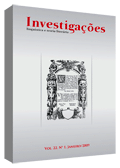O narrável da guerra e o inimigo objetivo, sob o céu de Hamburgo, em “O mau humor de Wotan”, de João Guimarães Rosa
Resumo
Pretende-se identifi car neste conto de João Guimarães Rosa, “O mau humor de Wotan”, gestado no período relativo à Segunda Guerra Mundial, no âmbito das relações interpessoais entre soldados compatriotas, os momentos que culminam na reação radical ao “inimigo objetivo”, conforme “conceituado” pela cientista política Hannah Arendt. É sabido que o plano nazista recaia sobre qualquer um que não se enquadrasse, milímetro que fosse, em sua concepção de povo e nação.Referências
ABBAGNANO, Nicola. 2000. Dicionário de filosofia. São Paulo: Martins Fontes.
ARENDT, Hannah. 2007. Origens do totalitarismo. São Paulo: Companhia das Letras.
BENJAMIM, Walter. 1985. Magia, técnica, arte e política. São Paulo: Brasiliense.
CANETTI, Elias. 1995. Massa e poder. São Paulo: Companhia das Letras.
COSTA, Ana Luiza Martins. 2006. Veredas de viator. In: João Guimarães Rosa. Cadernos de Literatura Brasileira. São Paulo: Instituto Moreira Salles.
ÉSQUILO. 2004. Prometeu acorrentado, ájax, alceste. 5ª ed. Rio de Janeiro: Jorge Zahar Editor.
GALIMBERTI, Umberto. 2006. Psique e techne. São Paulo: Paulus.
HOBSBAWM, Eric. 1995. Era dos extremos. São Paulo: Companhia das Letras.
HOUAISS, Antonio. 2001. Dicionário houaiss de língua portuguesa. Rio de Janeiro: Objetiva.
NIETZSCHE, Friedrich Wilhelm. 2005. Escritos sobre a história. Rio de Janeiro: Editora PUC-Rio.
ROSA, João Guimarães. 1985. Ave palavra. 3ª ed. Rio de Janeiro: Nova Fronteira.
______. 1984. João Guimarães Rosa ficção completa. Rio de Janeiro: Nova Aguilar.
______. 1969. Primeiras estórias. 5ª ed. Rio de Janeiro: José Olympio.
______. 1956. Grande sertão: veredas. 2ª ed. Rio de Janeiro: José Olympio.
SCHOPENHAUER, Arthur. 2004. O mundo como vontade de representação. Rio de Janeiro: Contraponto.
Downloads
Publicado
Como Citar
Edição
Seção
Licença
Copyright (c) 2009 João Batista Santiago Sobrinho

Este trabalho está licenciado sob uma licença Creative Commons Attribution 4.0 International License.
Autores que publicam na Revista Investigações concordam com os seguintes termos:
Autores mantêm os direitos autorais e concedem à revista o direito de primeira publicação, com o trabalho simultaneamente licenciado sob a licença Creative Commons Atribuição 4.0 Internacional (CC BY 4.0) que permite o compartilhamento do trabalho com reconhecimento da autoria e publicação inicial nesta revista.
Autores têm autorização para assumir contratos adicionais separadamente, para distribuição não-exclusiva da versão do trabalho publicada nesta revista (exemplo: depositar em repositório institucional ou publicar como capítulo de livro), com reconhecimento de autoria e publicação inicial nesta revista.
Qualquer usuário tem direito de:
Compartilhar — copiar e redistribuir o material em qualquer suporte ou formato para qualquer fim, mesmo que comercial.
Adaptar — remixar, transformar e criar a partir do material para qualquer fim, mesmo que comercial.
O licenciante não pode revogar estes direitos desde que você respeite os termos da licença.
De acordo com os termos seguintes:
Atribuição — Você deve dar o crédito apropriado, prover um link para a licença e indicar se mudanças foram feitas. Você deve fazê-lo em qualquer circunstância razoável, mas de nenhuma maneira que sugira que o licenciante apoia você ou o seu uso.
Sem restrições adicionais — Você não pode aplicar termos jurídicos ou medidas de caráter tecnológico que restrinjam legalmente outros de fazerem algo que a licença permita.

